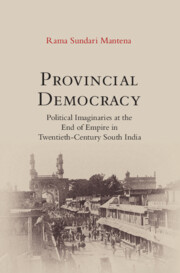Book contents
- Frontmatter
- Contents
- List of Figures
- Acknowledgements
- List of Abbreviations
- Map
- Introduction: Self-Determination, Federation, and Civil Liberties in Twentieth-Century South India
- 1 Liberalism and Anti-Colonialism in South India
- Part I Federation
- Part II Civil Liberties
- Conclusion: After Empire—Language and Regionalism
- Bibliography
- Index
1 - Liberalism and Anti-Colonialism in South India
Published online by Cambridge University Press: 30 April 2023
- Frontmatter
- Contents
- List of Figures
- Acknowledgements
- List of Abbreviations
- Map
- Introduction: Self-Determination, Federation, and Civil Liberties in Twentieth-Century South India
- 1 Liberalism and Anti-Colonialism in South India
- Part I Federation
- Part II Civil Liberties
- Conclusion: After Empire—Language and Regionalism
- Bibliography
- Index
Summary
In his sweeping history of Indian liberalism, Recovering Liberties, C. A. Bayly argues for the need to reassess a broad range of nineteenth-century Indian thought in pursuit of political and social liberty. Bayly draws attention to the complexities of studying liberal thought in colonial India even as liberalism was quite obviously constrained and compromised by what Eric Stokes had earlier identified as authoritarian in its colonial career. The contradictions of liberalism and empire have been recently explored by a broad range of scholars. Despite the complexity of imperial politics and the contradictory career of liberalism in the colony, Indian liberal thought emerged, Bayly argues, in the nineteenth century into a powerful political and social discourse arguing for a set of personal freedoms in pursuit of political and social liberties. While the language of liberalism offered Indians a way to argue for political and social liberties, under the constraints of colonial rule, the ways in which they formulated demands for rights and freedoms cannot be folded into the historical trajectory of classical liberalism. The rise of new political discourses that re-energized public spheres (particularly with the expansion of vernacular public spheres) at the turn of the twentieth century brought forth new political activism and debates over freedom, individual rights, and civil liberties. In essence, what we see at the turn of the twentieth century is the rise of political imaginaries shaped by ideas of self-rule and self-determination, which in turn led to a deepening of Indians’ commitment to institutions of democracy alongside the rise of nationalisms. Furthermore, during the early decades of the twentieth century, there were competing political imaginaries pulling intellectuals and activists from an exclusive focus on the nation to that on conceptualizing the region and interests specific to the region. The turn to the region, I argue, shifts the story of nationalism in the colony to a story of democracy. What does a turn to building democratic institutions mean at the regional level? With the Government of India Act of 1919 and the devolution schemes that enabled local governing, there also emerged regional discourses of self-government and self-rule that energized activist intellectuals, prompting them to shift their attention from building nationalist solidarity (to aid anti-colonial nationalism) to expanding local and regional democratic culture.
- Type
- Chapter
- Information
- Provincial DemocracyPolitical Imaginaries at the End of Empire in Twentieth-Century South India, pp. 30 - 64Publisher: Cambridge University PressPrint publication year: 2023



